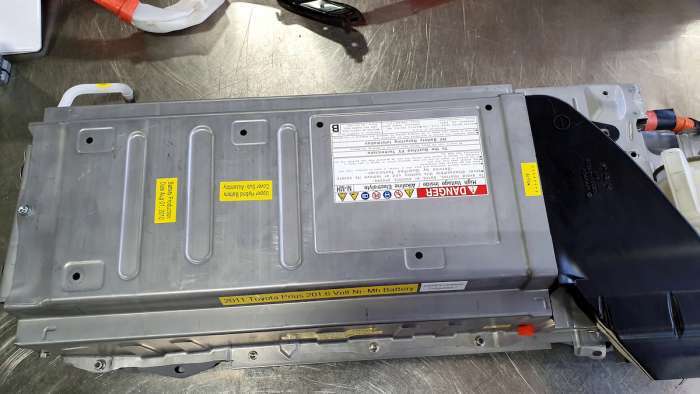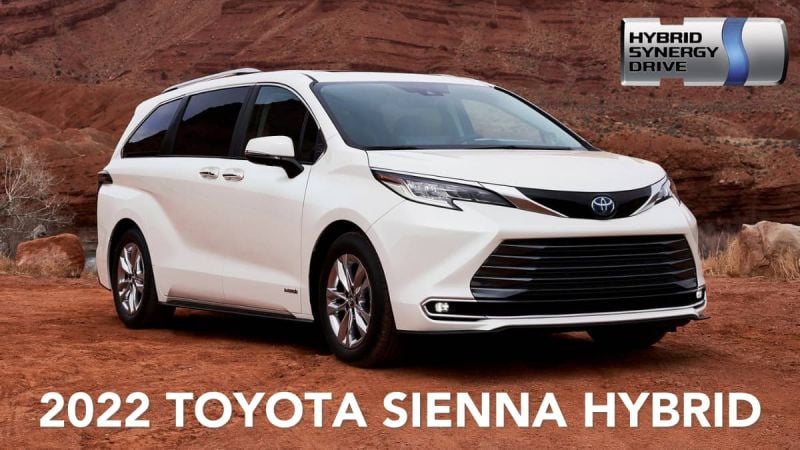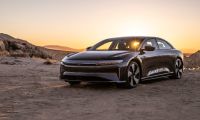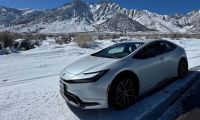Toyota plans on having all of its vehicles in a hybrid form by 2025. Included in the 2021 model year is the Toyota Sienna Hybrid option. Toyota now only offers Sienna in a hybrid choice but with or without AWD-e (all-wheel drive, electric).
As an avid hybrid owner and a family man, owning one of these new hybrid vans is a no-brainer, other than a tiny issue. Toyota is still using NiMH battery tech. While this is frustrating, all hope is not lost. I believe I know why Toyota uses it still and why you should feel good about getting one.
Why Toyota Still Uses Ancient NiMH Battery Tech
The term "tried and true" rings throughout the halls of Toyota. Another common saying is, "if it ain't broke, don't fix it.' This is a mantra that Toyota has used for eons when building and developing vehicles. The thing is, it works for them even though it may keep them from branching into other markets.

Even though NiMH battery tech is over 30 years old, Toyota has a ton of data supporting its use and lifespan. Data tells us everything we need to know about forecasting and longevity of a vehicle and what to expect as far as warranty.
If you have not read about Toyota updating their hybrid battery warranty, it is now 120 months/150,000 miles and only applies to these CA Emission states CA, CT, ME, MD, MA, NJ, NY, OR, RI and VT.
Conclusion
The fact that Toyota is still using NiMH is fascinating to me. The tech is proven, and it is safer than lithium-ion or polymer. Thermal runaway does not happen with NiMH, and safety is a big thing for Toyota.
Toyota also uses NiMH because it is predictable. They know that most people will outlive the warranty on the battery or trade the vehicle in within 5 years. It is all about the data.
NiMH for Toyota also has a more substantial fixed cost. They have used it so long and refined the tech that it is easy to get costs dialed in for the end product.
Overall, Toyota uses NiMH because they know how to keep their business running with their data from decades of research.
That is all for today. Thank you for reading. Remember, today's adventure is tomorrow's story, have an adventure today.
Take a look at this recent Toyota announcement about their partnership with battery maker BYD.
Check out this wild new battery tech that Tesla has and why it will forever change the auto industry.
Also, watch Toyota suddenly bringing its BZ4X electric SUV concept to United States on Torque News Youtube channel and please subscribe us on Youtube and follow on Twitter for daily Toyota and EV news reports.
Peter Neilson is an automotive consultant specializing in electric cars and hybrid battery technologies. He holds a Bachelor of Science in Automotive Service Technology from Weber State University. Peter can be reached on Linkedin and you can tweet him at The_hybrid_guy on Twitter. Find his page on Facebook at Certified Auto Consulting. Read more of Peter's stories at Toyota news coverage on Torque News. Search Toyota Prius Torque News for more in depth Prius coverage from our reporter.
Set Torque News as Preferred Source on Google












Comments
Certainly we keep using NiMH
Permalink
Certainly we keep using NiMH batteries because they have been a hallmark product for our hybrid electric vehicles. However, your article seems to imply that the technology is old and outdated, when, in fact, we have continued innovating in this space and have started using a completely new NiMH battery in our vehicles.
An example is our latest Aqua, a vehicle not sold in the U.S., but the battery used in it could hypothetically make its way here in other vehicles. The new Aqua is equipped with a high-output bipolar NiMH battery.
Bipolar batteries are advantageous because they have a greater active surface area with a lower resistance, allowing larger current flow and increased output. These changes mean improved accelerator response and better, more powerful acceleration from low speeds. Of course those aren't the only advantages: the new bipolar battery will also help extend the drivable range.
Finally, when looking at the new bipolar battery vs the previous NiMH batteries we were using, the new battery is designed to deliver 1.5 times greater output per cell. This means you can offer the same level of output with less cells, or you can keep the pack the same size and have much greater output for the vehicle.
While it might seem stale and no longer current with a lot of other OEMs making vehicles with Li-ion, there is something to be said about the safety and reliability of NiMH and the ability to continue to innovate and improve these types of batteries. It is precisely because of our long experience in this technology that we are able to keep using and improving them.
I certainly cannot deny that
Permalink
In reply to Certainly we keep using NiMH by Aaron Fowles (not verified)
I certainly cannot deny that Toyota is a company that bases their decisions after looking at the research and data that comes from their vehicles. LiFePo technology should certainly be considered as a viable option to Li-Lion or NiMH because of what Project Lithium is proving right now.
My article does point out that NiMH is old tech I cannot deny that but Toyota has also been very quiet about improvements made to NiMH technology.
I am actually surprised that someone from corporate is replying to this article. I would love the opportunity to learn more about how Toyota is innovating and improving NiMH. I can see that you are saying 1.5 times better output from them, I would love the opportunity to see the improvements and help people understand why Toyota is the leader in hybrid technology.
I am constantly trying to get more information on the improvements that Toyota is making all the time with hybrid tech and how it is one of the best ways we can proceed forward with the future of transportation.
Happy to discuss this further with you.
Hi, This was a great posting…
Permalink
In reply to I certainly cannot deny that by Peter Neilson
Hi,
This was a great posting, and it was extremely interesting that someone from Toyota responded. Keep up the good work!
Best wishes,
Mark Bahner
My 2001 Prius self…
Permalink
In reply to Certainly we keep using NiMH by Aaron Fowles (not verified)
My 2001 Prius self discharged every 2 weeks while it was still under warranty and couldn't be jumped we had to have it towed to the Toyota dealer. Toyota of Carlsbad CA said it was normal for the battery to self discharge in 2 weeks I've never even heard of that much leakage for nickel cadmium let alone nickel metal hydride!
I'd rather have a NiMH
Permalink
I'd rather have a NiMH battery in cold climates. But that's just me.
With the recent development
Permalink
In reply to I'd rather have a NiMH by John Goreham
With the recent development of the LiFePo battery from Project Lithium NiMH is an inferior tech. LiFePo has proven itself in cold climates over the past 7 years under cold testing duress. NiMH is certainly a good tech for durability no doubt but time is now proving there are other viable options.
All states now get the 10
Permalink
All states now get the 10 year 150,000 mile hybrid battery warranty.
Per Toyota "Starting with the 2020 model year, every hybrid battery warranty is being increased from 8 years or 100,000 miles, to 10 years from date of first use, or 150,000 miles whichever comes first."
But there must be some fine
Permalink
In reply to All states now get the 10 by rjparker (not verified)
But there must be some fine print about percentage of original or rated capacity over time to qualify for warranty coverage.
There are specific codes
Permalink
In reply to But there must be some fine by Steve Grant (not verified)
There are specific codes required. At that point Toyota replaces with new. Normally thw batteries easily make 150,000 miles which has been available for many years in the Carb states.
"The term "tried and true"
Permalink
"The term "tried and true" rings throughout the halls of Toyota. Another common saying is, "if it ain't broke, don't fix it.'"
True words for sure. It is this lack of innovation that will drive Toyota out of business as the auto industry turns to EVs. Tesla is on the road to business success while Toyota is on the road to bankrupty.
But yeah, they're good at "tried and true."
My '09 Escape Hybrid has
Permalink
My '09 Escape Hybrid has about 170,000 miles on it and still gets as good mileage as when I bought it. Mileage would be reduced by lower capacity of the battery pack because I commonly exceed the battery's capacity limits. The battery is NiMH. So unless the battery had capacity initially set aside to be used as the battery ages, to maintain performance, the battery has not degraded. I note that occasionally and automatically it performs a "conditioning cycle" on the battery, which I sometimes notice happening but know little about.
Whereas I understand Lithium-ion batteries lose capacity over time whether they are used or not.
Toyota is pretending they
Permalink
Toyota is pretending they have reinvented NiMH, But I am not aware of any manufacturer that has gone back to NiMH battery power. NiMH has memory issues that Li-ion doesnt. Li-ion is also easier to charge than NiMH since there is a clear voltage change of the cell as it reaches full charge. If it is better, why doesn't Toyota offer a full battery warrenty in all states?
The Low Self Discharge
Permalink
In reply to Toyota is pretending they by Lars (not verified)
The Low Self Discharge version of NiMH was invented in 2015 and has no memory issues. Toyota didn't do that, but in a sense yes the NiMH has been "reinvented" recently.
NiMH isn't ancient, it's
Permalink
NiMH isn't ancient, it's invention and progression mirrors lithium ion almost exactly. The two technologies are literally the exact same age. In some ways, and using a literal definition, NiMH is actually newer tech. The first lithium ion cell was invented in 1965. The first NiMH in 1967, making NiMH a newer technology literally speaking. But the first consumer grade lithium ion hit the market in 1991, while the first consumer grade NiMH in 1989, both are 30 years old. But we don't use the same materials anymore. Theres been advancements since. Most quality NiMH produced today are Low-Self Discharge models, a technology invented in 2015. Meanwhile, most lithium ion batteries powering EV's today are still Nickel Manganese Cobalt Oxide cells, a technology invented in 2001. You could go back and forth like this forever, with different advancements at different times, but you can't call NiMH ancient when they both were invented and hit the market within 2 years of each other.
NiMH isn't ancient technology
Permalink
NiMH isn't ancient technology, its a different technology. In some ways its superior to lithium batteries (they are more durable and have a longer life span overall). In some ways its inferior (the memory issue is most concerning, yet can be resolved by full discharge and recharge, the memory issue is not a longevity issue).
Who knows, when lithium supply runs thin, and before some truly newer and fantastic battery tech comes out, we might need to switch back to nickel batteries. Nickel is more abundant and highly recyclable.
"Who knows, when lithium…
Permalink
In reply to NiMH isn't ancient technology by Rick (not verified)
"Who knows, when lithium supply runs thin, and before some truly newer and fantastic battery tech comes out, we might need to switch back to nickel batteries. Nickel is more abundant and highly recyclable."
New methods to obtain lithium are being developed all the time. Google:
Princeton Engineering, revolutionizing lithium production on a string
Do you mind if I quote a…
Permalink
Do you mind if I quote a couple of your posts as long as I provide credit and sources back to your website? My blog site is in the exact same niche as yours and my visitors would truly benefit from some of the information you present here. Please let me know if this alright with you. Appreciate it!